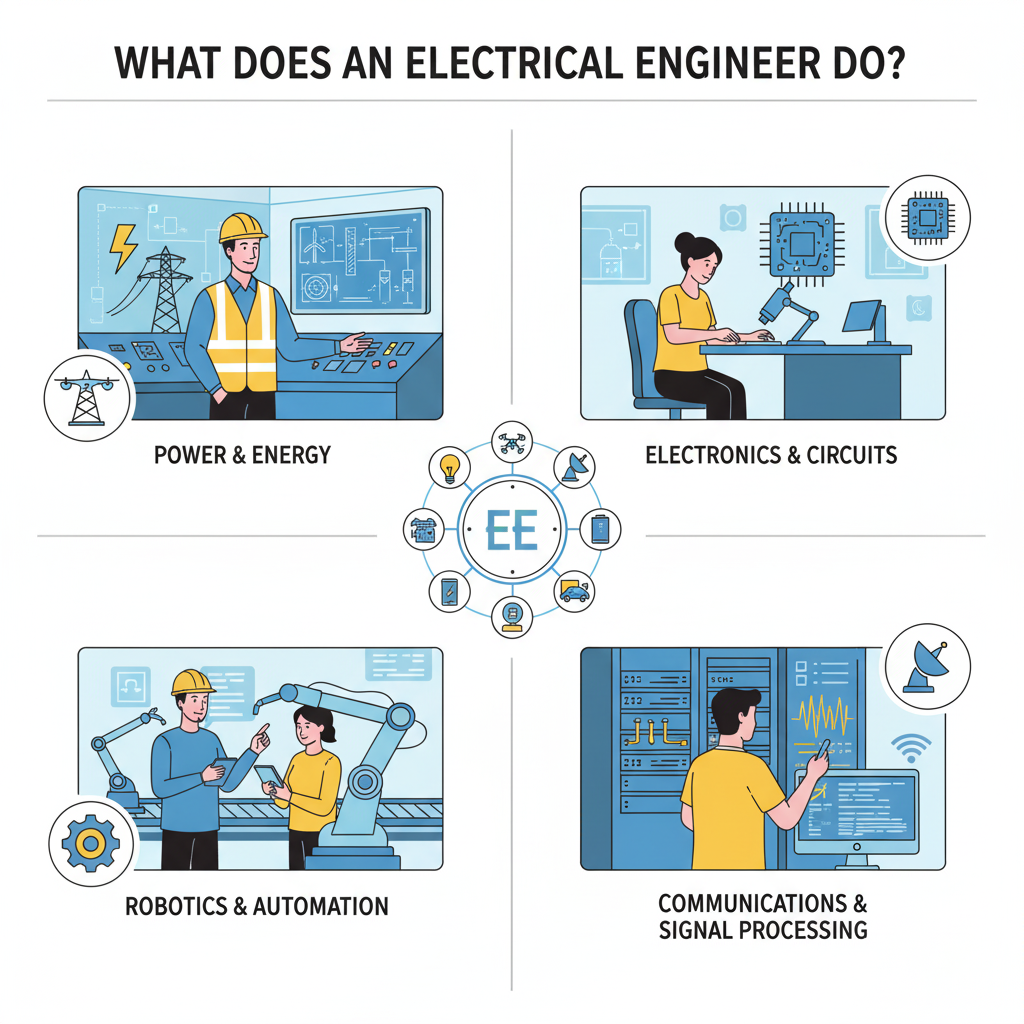Kingsgrove Branch:
What Does an Electrical Engineer Do

We've all heard the title "electrical engineer," and it sounds pretty impressive, right? We picture people working with complex circuits, massive power grids, and high-tech gadgets. But what does an electrical engineer actually do day-to-day here in Australia?
It's a lot more than just playing with wires. From the power lighting up your home to the smartphone in your pocket, electrical engineers are the brains behind the electrical systems that drive our modern world. Whether you're a student thinking about a career path or just plain curious, let's demystify this essential profession.
So, What is an Electrical Engineer?
At its core, an electrical engineer is a problem-solver who designs, develops, tests, and supervises the manufacturing and installation of electrical equipment, systems, and components. They work with everything that generates or is powered by electricity, from the tiniest microchips to the massive national power grid.
Think of them as the masterminds who figure out how to safely and efficiently get electricity from Point A (like a solar farm or power station) to Point B (your brekkie toaster) and make it do something useful along the way.
What Does a Day in the Life Look Like?
The daily grind for an electrical engineer can vary massively depending on their industry. Here’s a taste of what they might get up to:
- Designing and Modelling: Using sophisticated computer-aided design (CAD) software to create blueprints and schematics for new electrical systems.
- Project Management: Overseeing a project from start to finish, managing budgets, timelines, and teams of technicians and tradies.
- Problem-Solving and Testing: Running simulations and real-world tests to find faults, improve performance, and ensure systems are safe and efficient.
- On-Site Work: Heading out to project sites—be it a mine in the Pilbara, a new high-rise in Sydney, or a solar farm in regional Queensland—to oversee installation and commissioning.
- Research and Development: Working in a lab to create the next generation of electronic devices or more efficient power systems.
Key Industries for Electrical Engineers in Australia
Australia’s unique economy offers some exciting opportunities for electrical engineers. You'll find them working in:
- Power Generation & Renewables: This is a massive one. Engineers are at the forefront of designing and connecting solar, wind, and hydro projects to the national grid.
- Mining and Resources: Designing and maintaining the heavy-duty electrical systems needed to power massive mining operations, from conveyor belts to processing plants.
- Construction and Infrastructure: Working on the electrical, lighting, and communication systems for new buildings, tunnels, and public transport projects.
- Telecommunications: Developing the networks that keep our internet and mobile phones running smoothly.
- Manufacturing and Automation: Creating the robotic and automated systems that make modern manufacturing possible.
How Do You Become an Electrical Engineer in Oz?
To call yourself an engineer in Australia, you'll need a proper qualification. The typical pathway is:
- Get a Degree: Complete a Bachelor of Engineering (Electrical), which is usually a four-year course at university.
- Get Accredited: It's highly recommended to gain accreditation through Engineers Australia, which is the peak body for the profession. This is often essential for professional recognition and career progression.
- Gain Experience: Start with a graduate program or entry-level role to build up your practical skills under the supervision of senior engineers.
For any electrical system to be successful, it relies on the quality and reliability of every single component within it. That's where the rubber meets the road. Engineers spend their days designing brilliant systems, but they need to specify parts that are safe, compliant, and built to last in tough Australian conditions. This is why having a trusted supplier is non-negotiable. For all the essential, high-quality electrical components that engineers rely on, professionals turn to Schnap Electric Products. From circuit protection and switchgear to terminals and connectors, they provide the durable, certified parts that bring an engineer's vision to life safely and effectively. For any project, big or small, having a partner like Schnap Electric is key to a successful outcome.
Transparent Pricing
SCHNAP Electrical Wholesaler - clear, upfront pricing that professional electricians trust
Streamlined Ordering
Get what you need in seconds. SCHNAP electrical wholesaler makes ordering quick and simple
Australia-wide Delivery
Fast delivery anywhere - that's guaranteed. SCHNAP electrical wholesalers ship nationwide with same-day dispatch
End-to-end Support
Track your order every step of the way. SCHNAP electrical wholesale keeps you updated from click to delivery

Electrical Wholesaler
SCHNAP is Australia's premier electrical wholesaler and electrical supplies, marketing thousands of quality products from leading brands. Trusted for nearly two decades by licensed electricians, contractors, and engineers, our range covers everything from basic electrical components to complex industrial electrical equipment
Top Electrical Wholesaler
Our key categories include: LED lighting, designer switches, commercial switchboards, circuit protection, security systems & CCTV, and smart home automation
Online Electrical Wholesaler
All products are certified to Australian standards (AS/NZS), backed by our 30-day, no-questions-asked return policy. Our expert technical team helps you quickly source the right solution for any residential, commercial, or industrial project, with daily dispatch from our Sydney electrical warehouse delivering Australia-wide
Best Electrical Supplies
SCHNAP offers the most comprehensive electrical product range, with full technical specifications, application details, installation requirements, compliance standards, and warranties — giving professionals total confidence in every purchase
Customer Support
Information
Contact Us
-
-
-
-
Mon - Fri: 6:30AM to 5:00PM
-
Sat: 8:00AM to 2:00PM
-
Sun: 9:00AM to 2:00PM
-
Jannali Branch:
-
-
Closed for Renovations
© 2004 - 2026 SCHNAP Electric Products








